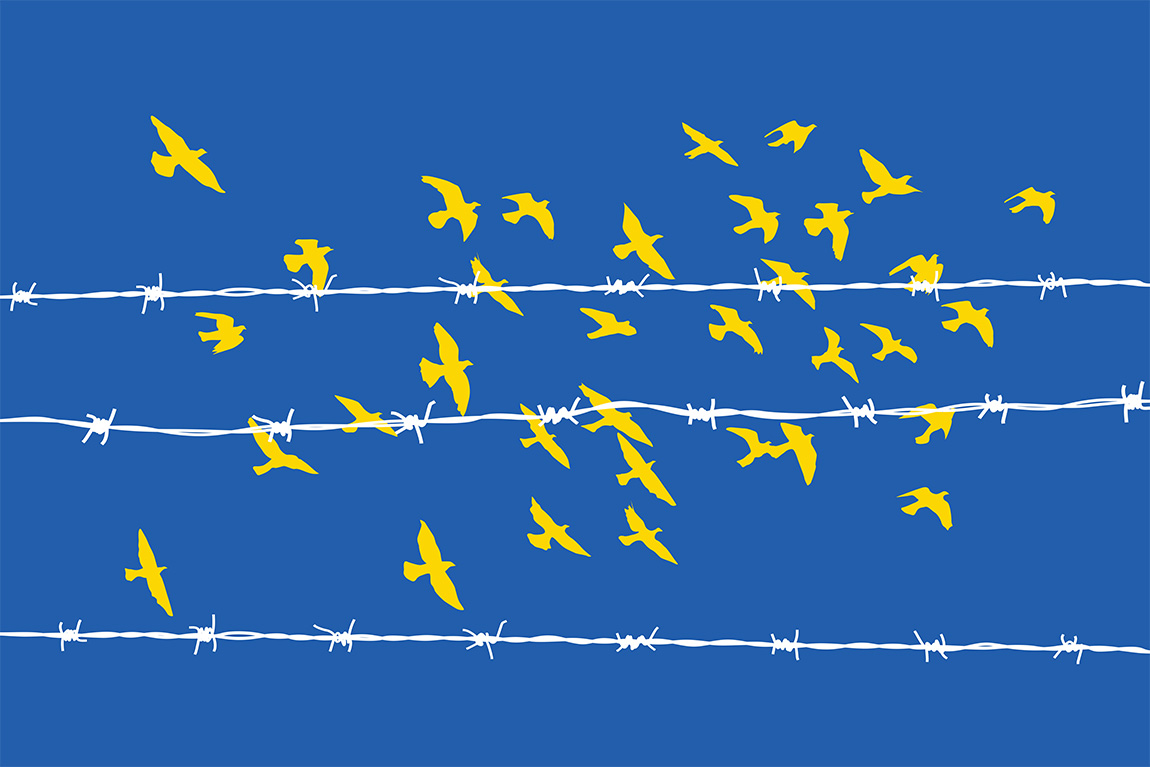Migration Risks
The war in Ukraine highlights the need to reform international refugee law.By: Marcia Morgan Wednesday, August 3, 2022 10:19 AM
 Illustration by iStock.com/Estherpoon
Illustration by iStock.com/EstherpoonPerspective is a feature of Muhlenberg Magazine. This article originally ran in the Summer 2022 issue.
June 3 marked 100 days since the Russian invasion of Ukraine. The war has had a devastating impact in this short amount of time. One way to measure a war’s violence and disruption is to highlight the number of displaced people. This calculation often emphasizes the number of refugees, people who crossed a national boundary to avoid harm caused by reasons of race, national origin, political belief, religious persecution and membership in a specific social group. (Notably, the legal definition of “refugee,” as covered in the UN 1951 Convention on Refugees and its 1967 Protocol, does not include those fleeing ecological disaster.) In the case of Ukraine, there are already more than 7 million refugees.
This figure does not include those internally displaced, the most recent data of which tallies an additional estimated 7 million in Ukraine. The majority of forcibly mobile people from all causes globally are not refugees but are internally displaced. Internally displaced individuals are at risk of starvation, lack of medical care and homelessness caused by conflict and ecological disruption, as well as summary executions, deportations to holding camps and genocide.
Among those forcibly displaced around the globe, refugees have the most resources to flee and are the most educated and well connected. Most news coverage in Western media focuses on refugees seeking relocation in western European Union nations and their northern allies, the United Kingdom, Australia or North America, the collection of nations referred to as the “Global North.” Drastically less attention is paid to the worldwide population of internally displaced individuals, most of whom reside and find safe haven in the “Global South.”
The international refugee and forced migration predicament calls for urgent reform of international refugee law. Not only are two-thirds of the world’s forced migrants unprotected because they are displaced within national boundaries, but the law itself can cause more harm than good even for those who do qualify as refugees (who apply for refugee status before they enter a country) or asylum-seekers (who flee to a country first and apply after). This is because of factors that allow nations to delay granting refugee appeals for safe haven for up to 10 years or more. During this time, refugees and asylum-seekers are punished for having followed international law by being detained indefinitely without adequate information about their future. Additionally, the percentage of approved applications is dismally low, recently averaging 10 to 20 percent of those determined by immigration judges as warranting credible fear (which in the United States in 2021 constituted 73 percent of cases for asylum and refugee status).
Consider also the legal precedent developed to prevent the danger of “in orbit,” a concept in international refugee law that indicates the problem of asylum seekers and refugees getting bounced from one nation to the next, each unwilling to commit to serving as a permanent or long-term host. This legal precedent has created a more trenchant problem of tying the application of asylum to the country that is first and most directly accessed from the country of flight, which may not be the right place of relocation for the individual refugee or their family.
This ‘solution’ binds asylum to a specific and limited conception of place. Not only does this encourage dangerous attempts to reach the desired destination nations along perilous paths, but it strips refugees of their human autonomy and agency by hindering any realization of their aim to relocate where appropriate. “In orbit” has been replaced by “in limbo,” as the determination procedures it mandates often detain applicants instead of permitting them to reside with family or refugee hosts. This detention can become protracted while their claims, which may never be heard, are awaiting adjudication.
As the United Nations High Commissioner for Refugees (UNHCR), European Council on Refugees and Exiles and the European Parliament have all noted, what is legal in this context is unethical and unfair for both nations and refugees. This unethicality locks refugees into a “sedentarist contract,” a contract that functions from the biased sedentary perspective that people are necessarily tied to one place in their lives. There are compelling arguments in the legal, political and philosophical communities that the current system, which forces refugees who do everything right to be detained for years, is an unethical system all the way down.
In response to this dilemma, the UNHCR has recommended measures that include granting asylum seekers the right to a “suspensive appeal” (they may remain in the country where they desire to seek asylum while appealing against their transfer to the country they reached first), asking that people be detained only as a last resort and resisting transfers to states that could be dangerous.
Still, the system isn’t working. As noted by the Refugee Community Center at Allentown’s Church of the Mediator, it will be years before the Lehigh Valley receives any refugees from Ukraine, given the increasingly slow process of case decision. Reform of international refugee law is required not only to capture the realities of the 21st century, which include the fact that the large majority of forcibly displaced individuals move within political borders and not beyond them. But even for those who are protected under international refugee law, its intrinsic flaws frequently create prohibitive situations.
Marcia Morgan is an associate professor of philosophy at Muhlenberg.
